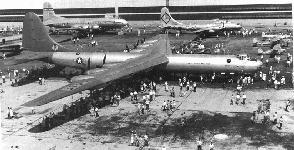
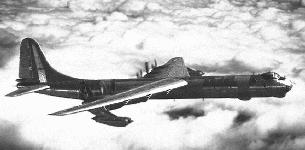
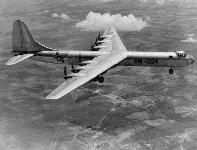
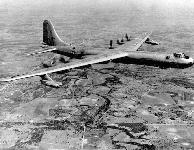
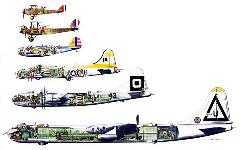




The B-36 was under development in 1941 and first flew on August 8, 1946. The first operational models were delivered to SAC in 1948, but due to early problems the B-36 units were not fully operational until 1951. The B-36 cost $3.6 million each. It had a 3,740-nm combat radius with a 10,000-pound payload, or a 1,757-nm radius with a maximum bomb load of 86,000 pounds. The last B-36 was built in August 1954, for a total production of 388 aircraft. The B-36 force was modernized with the advent of the long range B-52. On 29 June 1955 the first B-52 was delivered to SAC. At that time there were 340 of the B-36s assigned. When the last B-36 was retired in 1959, for a service life of 8 years, there were almost 500 B-52 aircraft in the US bomber fleet
The B-36, an intercontinental bomber, was designed during World War II.
The airplane made its maiden flight Aug. 8, 1946, and, on June 26, 1948,
the Strategic Air Command received its first B-36 for operational use. By
the time production ended in August 1954, more than 380 B-36s had been built
for the U.S. Air Force.
In 1958-59, the B-36 was replaced by the more modern B-52. During the years
it was in service, the airplane was one of America's major deterrents to
aggression by a potential enemy. The fact that the B-36 was never used in
combat was indicative of its value in "keeping the peace."
Specifications |
|
| Span: | 230 feet |
| Length: | 162 feet, 1 inches |
| Height: | 46 feet, 9 inches |
| Weight: | 410,000 pounds loaded |
| Armament: | Sixteen M24 20mm cannon in eight nose, tail and fuselage
turrets, 86,000 pounds of conventional or nuclear bombs |
| Engine: | Six Pratt & Whitney B 4360s of 3,800 horsepower and four General Electric J47s of 5,200 pounds thrust each |
| Maximum speed: | 435 mph |
| Cruising speed: | 230 mph |
| Range: | 10,000 miles |
| Service ceiling: | 45,700 feet |
| Cost: | $3,701,000 |




